2018春牛津深圳版英语七下Unit 6《Electricity》知识归纳及练习题
- 格式:docx
- 大小:38.02 KB
- 文档页数:11
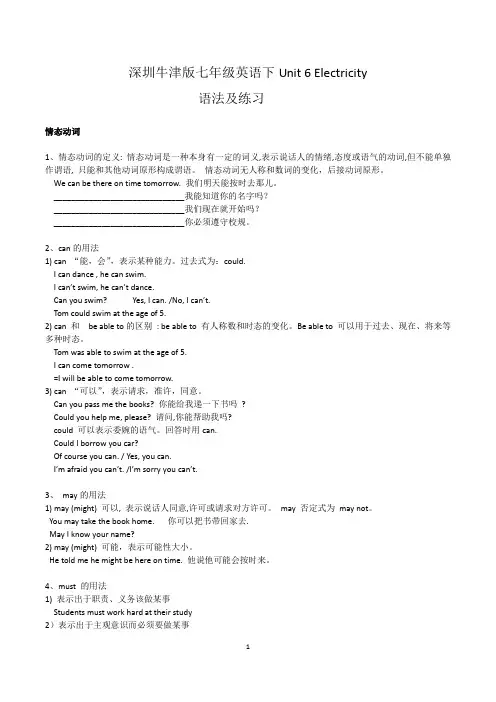
深圳牛津版七年级英语下Unit 6 Electricity语法及练习情态动词1、情态动词的定义: 情态动词是一种本身有一定的词义,表示说话人的情绪,态度或语气的动词,但不能单独作谓语, 只能和其他动词原形构成谓语。
情态动词无人称和数词的变化,后接动词原形。
We can be there on time tomorrow. 我们明天能按时去那儿。
______________________________我能知道你的名字吗?______________________________我们现在就开始吗?______________________________你必须遵守校规。
2、can的用法1) can “能,会”,表示某种能力。
过去式为:could.I can dance , he can swim.I can’t swim, he can’t dance.Can you swim? Yes, I can. /No, I can’t.Tom could swim at the age of 5.2) can 和be able to的区别: be able to 有人称数和时态的变化。
Be able to 可以用于过去、现在、将来等多种时态。
Tom was able to swim at the age of 5.I can come tomorrow .=I will be able to come tomorrow.3) can “可以”,表示请求,准许,同意。
Can you pass me the books? 你能给我递一下书吗?Could you help me, please? 请问,你能帮助我吗?could 可以表示委婉的语气。
回答时用can.Could I borrow you car?Of course you can. / Yes, you can.I’m afraid you can’t. /I’m sorry you can’t.3、may的用法1) may (might) 可以, 表示说话人同意,许可或请求对方许可。
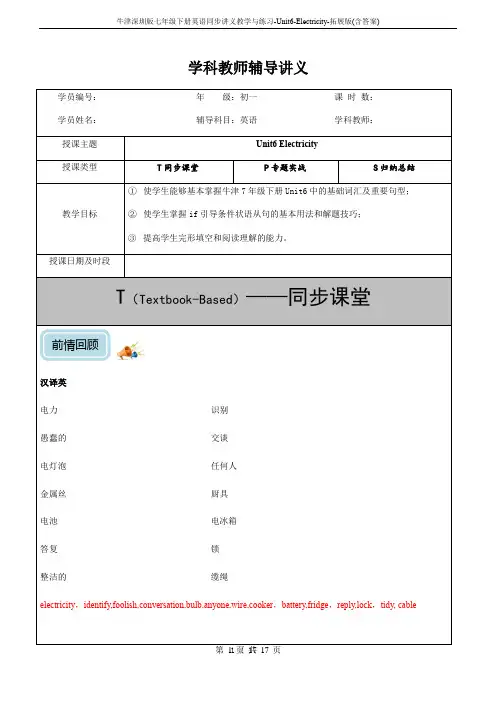
学科教师辅导讲义前情回顾汉译英电力识别愚蠢的交谈电灯泡任何人金属丝厨具电池电冰箱答复锁整洁的缆绳electricity,identify,foolish,conversation,bulb,anyone,wire,cooker,battery,fridge,reply,lock,tidy, cable11.a power station 发电站12.a packet of 一包13.in packets 成/几包的14.tidy up=clean up 整理好15. switch off=turn off 关(灯,电器等)16. switch on=turn on 开(灯,电器等)17.share sth with sb 与某人分享某物18.on time 准时19.be made up of 由……组成20.provide sth for sb=provide sb with sth 为……提供……21. care about 在乎,关心22. be ready to do sth. 准备去做某事23. get sb. sth. =get sth. for sb.给某人买某物典例分析例题1:( ) I think you are right in a way.A. probablyB. partlyC. all the timeD. in the end 解析:B in a way=partly 在某种程度上例题2:( ) Benny looked foolish when she made the mistakeA. sillyB. sadC. smartD. excellent 解析:A foolish 愚笨的=silly专题精讲if引导的条件状语从句引导条件状语从句最常用的连词是if,常见的if条件状语从句表示在某条件下,某事很可能发生,条件是可能存在的,主句中某种情况发生的概率也是很高的。
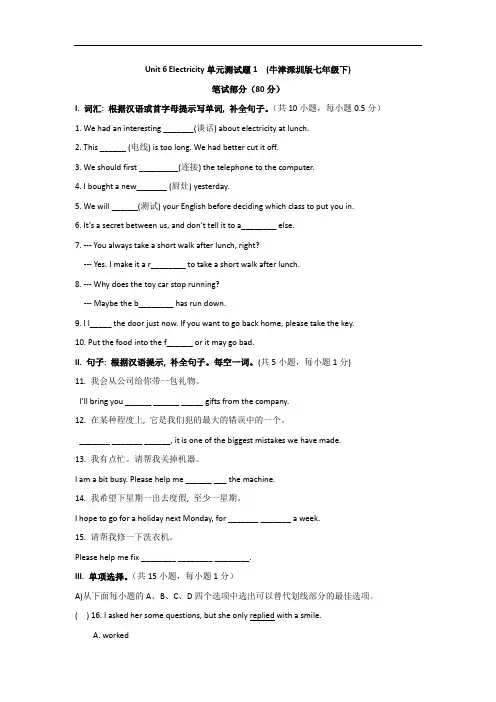
Unit 6 Electricity单元测试题1 (牛津深圳版七年级下)笔试部分(80分)I. 词汇: 根据汉语或首字母提示写单词, 补全句子。
(共10小题,每小题0.5分)1. We had an interesting _______(谈话) about electricity at lunch.2. This ______ (电线) is too long. We had better cut it off.3. We should first _________(连接) the telephone to the computer.4. I bought a new_______ (厨灶) yesterday.5. We will ______(测试) your English before deciding which class to put you in.6. It’s a secret between us, and don’t tell it to a________ else.7. --- You always take a short walk after lunch, right?--- Yes. I make it a r________ to take a short walk after lunch.8. --- Why does the toy car stop running?--- Maybe the b________ has run down.9. I l_____ the door just now. If you want to go back home, please take the key.10. Put the food into the f______ or it may go bad.II. 句子: 根据汉语提示, 补全句子。
每空一词。
(共5小题,每小题1分)11. 我会从公司给你带一包礼物。
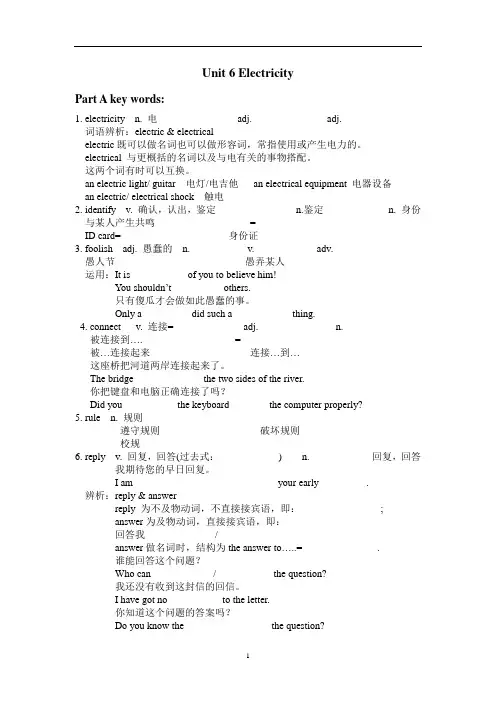
Unit 6 ElectricityPart A key words:1. electricity n. 电______________adj. _____________adj.词语辨析:electric & electricalelectric既可以做名词也可以做形容词,常指使用或产生电力的。
electrical 与更概括的名词以及与电有关的事物搭配。
这两个词有时可以互换。
an electric light/ guitar 电灯/电吉他an electrical equipment 电器设备an electric/ electrical shock 触电2. identify v. 确认,认出,鉴定____________n.鉴定____________n. 身份与某人产生共鸣___________________= _____________________ID card= _____________________身份证3. foolish adj. 愚蠢的n. _________ v. _________ adv. ___________愚人节___________________ 愚弄某人_________________运用:It is ___________of you to believe him!You shouldn’t __________others.只有傻瓜才会做如此愚蠢的事。
Only a _________ did such a ___________ thing.4. connect v. 连接=__________ adj. ____________ n. _____________被连接到….__________________ =____________________被…连接起来_________________ 连接…到… ____________________ 这座桥把河道两岸连接起来了。
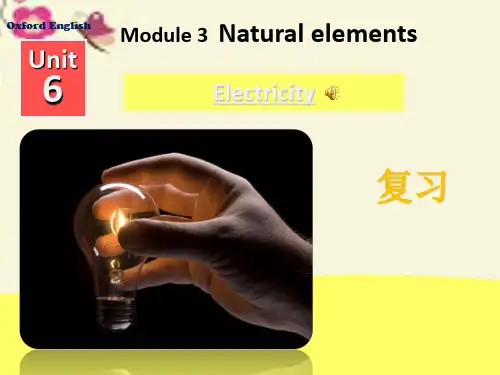
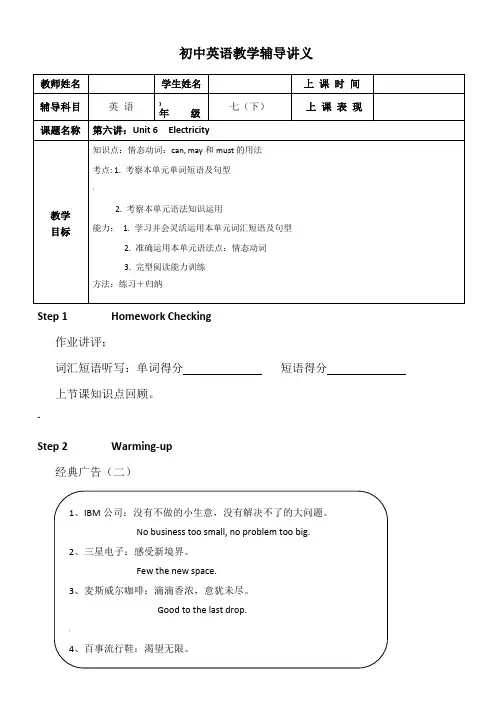
初中英语教学辅导讲义教师姓名学生姓名上课时间辅导科目英语)年级七(下)上课表现课题名称第六讲:Unit 6 Electricity教学目标知识点:情态动词:can, may和must的用法考点: 1. 考察本单元单词短语及句型!2. 考察本单元语法知识运用能力: 1. 学习并会灵活运用本单元词汇短语及句型2. 准确运用本单元语法点:情态动词3. 完型阅读能力训练方法:练习+归纳Step 1 Homework Checking作业讲评;词汇短语听写:单词得分短语得分上节课知识点回顾。
~Step 2 Warming-up经典广告(二)1、IBM公司:没有不做的小生意,没有解决不了的大问题。
No business too small, no problem too big.2、三星电子:感受新境界。
Few the new space.3、麦斯威尔咖啡:滴滴香浓,意犹未尽。
Good to the last drop.;4、百事流行鞋:渴望无限。
Step 3 Phonetic Symbols语音基础小练习:/选出下列每组单词中音节数目与其他三项不同的一项。
( ) 1. A. bottom B. reply C. continue D. return ( ) 2. A. test B. fat C. fridge D. journey ( ) 3. A. major(C. tidyD. oxygenB. enjoy( ) 4. A. remember B. perfect C. potato D. furniture ( ) 5. A. favourite B. harmful C. produce^D. airport keys: CDDBAStep 4 Language LearningUnit Six Electricity单词归纳【单词重点讲解】1. electricity n. 电. Can you get me a packet of electricity 你能给我一包电吗【解析】(1)electricity 意思是“电”,常常用作不可数名词《(2)这个单词共有五个音节:e-lec-tri-ci-ty. We use electricity to run machines. 我们使用电力来运行机器。
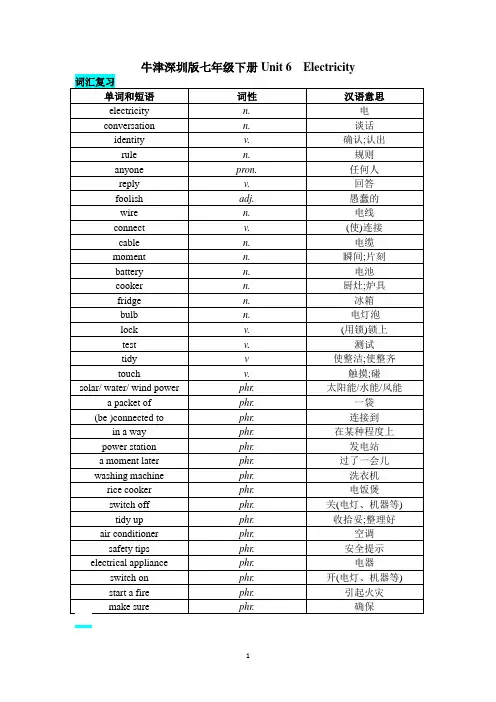
词汇复习单词和短语词性汉语意思electricity n. 电conversation n. 谈话identity v. 确认;认出rule n. 规则anyone pron. 任何人reply v. 回答foolish adj. 愚蠢的wire n. 电线connect v. (使)连接cable n. 电缆moment n. 瞬间;片刻battery n. 电池cooker n. 厨灶;炉具fridge n. 冰箱bulb n. 电灯泡lock v. (用锁)锁上test v. 测试tidy v 使整洁;使整齐touch v. 触摸;碰solar/ water/ wind power phr. 太阳能/水能/风能a packet of phr. 一袋(be )connected to phr. 连接到in a way phr. 在某种程度上power station phr. 发电站a moment later phr. 过了一会儿washing machine phr. 洗衣机rice cooker phr. 电饭煲switch off phr. 关(电灯、机器等)tidy up phr. 收拾妥;整理好air conditioner phr. 空调safety tips phr. 安全提示electrical appliance phr. 电器switch on phr. 开(电灯、机器等)start a fire phr. 引起火灾make sure phr. 确保过关检测一、词汇默写1.厨灶;炉具_____________________2.(用锁)锁上_____________________3.愚蠢的________________________4.使整洁;使整齐_________________5.发电站________________________6.过了一会儿____________________7.洗衣机________________________8.电饭煲________________________9.连接到________________________10.一袋_________________________ 11.空调__________________________12.太阳能/水能/风能______________13.电器_________________________14.开(电灯、机器等)_______________15.引起火灾_____________________16.确保_________________________ 17在某种程度上__________________18.收拾妥;整理好________________19.关(电灯、机器等)_______________20.安全提示______________________二、语篇填词(一)Electricity, (1)w___________is like water, in a way, gives us power. First, it(2) f___________from a power station. Then it comes to the cables under the street. Lastly. electricity comes to homes through thin (3)w___________which are (4) c___________to the cables. With electricity, lights, TVS and computers can work.Electricity is very important to us. We need it at home, at work and in schools. We cant live in a world(5)w___________ electricity.(二)Electricity makes our lives (1)b___________.We use a lot of electrical appliances in our homes every day. Here are some tips to help us use them(2)s___________.First, when we use the rice (3)c___________, we should keep the outside of the pot dry. And don’t(4)s___________it on if the pot is empty. Second, don't put our hands in the washing machine when we use it to clean our clothes. Also, we should unplug it after(5)u___________it. Finally, don’t turn the microwave on when it is empty, because it might start a fire. When it is on, we had better stand at least one metre away from it. Before we put an object in a microwave, make sure it is microwave safe.三、完成句子1.我的电脑可以连接到你的(电脑)My computer can_____________ _____________ _____________ yours.2.他年纪足够大,可以开洗衣机了。
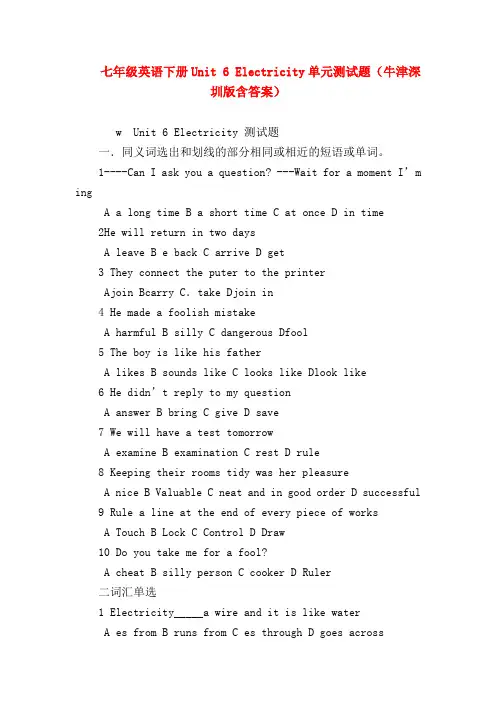
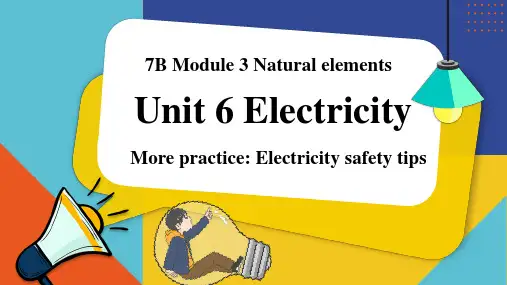
Unit 6 Electricity words精讲 1. electricity, n.电力; 电流,静电; 高涨的情绪; 紧张 While I was cooking supper, the electricity went off.. 链接:electrical电的, 有关电的;electric电的, 导电的, 电动的;electron电子 2. foolish,adj.愚蠢的; 鲁莽的; 荒谬的,可笑的 如:He was angry with himself for having made such a foolish mistake. 链接:fool (n.) 傻瓜 + ish → foolish (adj.) 愚蠢的 What a fool I was to believe he is a good man! 3. identify, vt.识别、认出,确定,使参与,把…看成一样;vi.确定;认同 如:Could you identify your coat among a hundred others. 链接:identical adj 同样的;identification n. 辨认, 鉴定, 证明; identify v. 识别, 鉴别,确定 4. cable, n. 缆绳绳索;[电学]电缆;巨缆 ;vt. 发电报至;电传;固定系牢 如:Steel cable will be used to replace worn ropes. Cable TV 有线电视 5. moment, n. 瞬间,片刻;时刻;重要,紧要; 红极一时 如:I'll be back in a moment. 链接:for the moment暂时\目前; at the (或 this) moment马上,任何一刻,随时。 6. touch, vt.触摸;使某物与…轻轻接触; n.触摸,碰;触觉,润色,痕迹;vi.接触;联系 如:He kept in touch with us while he was on vacation. 链接:get in touch with 和...取得联系;keep in touch with 和…保持联系。 二.Phrases精讲 1. (be) careful with小心对待;谨慎处理 These glasses are very expensive, so he is very careful with them. Be careful with those fireworks. They may cause fire. 2. connect to(使)连接;联结 Connect the hose to the tap and turn on the tap. 4. switch off关(电灯,机器) Please switch the light off before leaving the room. 5. turn off 关上 (switch on, turn on打开) In order to save electricity, please turn off/ switch off all the lights when you leave the room. 三、知识详解 1. I’m going to buy a packet of sweets. a packet of 一袋。其后可接可数名词复数或不可数名词用来表示数量。 不可数名词没有复数形式,在表示数量时,常用“a+单位量词+of+不可数名词”结构。 a+单位量词+of+不可数名词 a piece of meat; a piece of paper; a glass of apple juice; a bag of milk a +单位量词+of+可数名词复数 a basket of eggs; a bag of apples 数词+单位量词+of+不可数名词 two glasses of water; three cups of tea 数词+单位量词+of+可数名词复数 two packets of sweets ; three bags of pencils 2. It is like water, in a way… it a way 在某种程度上 In a way, you are right. 在某种程度上,你是对的. 与way的相关短语: In the way 妨碍;挡道 His hobby sometimes gets in the way of his studies. 有时他的爱好妨碍了他的学业. on the way 在途中;在路中 He is on the way to school now. 他现在在上学的途中. by the way 顺便问一下 By the way, who is Tom? 顺便问一下,谁是汤姆? all the way 一直 He studies hard all the way. 他学习一直很努力. 3. Electricity comes into our flat through thin wires. 电通过细电线进入我们的公寓. come into 进入……之内 Water comes into our houses through pipes(管线;管道;管子). 4. These are connected to cables under the street… connect 连接… 常用结构: be connected to sth. 连接到…… ; connect sth. to/with… 把…和…连接起来. Turn on your computer and connect it to the Internet. The railway line connects Wuhan to Shanghai. 5. A moment later, Daisy came back. A moment later 一会儿,没多久 A moment later, my friend came down . 过不多久,我的朋友下来了。 It is overcast in the sky. It must rain a moment later. 天阴沉沉的,过一会儿一定会下雨。 The waiter goes into the room with the beer a moment later.片刻之后,服务员端着啤酒走进了雅间。 (1)moment 可数名词,意为”瞬间;片刻” I’d like to talk to you for a moment. 与moment相关的短语: ① a moment ago 刚刚;刚才 He was here a moment ago. ② at the moment 现在;此刻 He is at home at the moment. ③wait a moment 等一会儿 Wait a moment, please. (2) later 副词,意为”后来;以后” 6. Batteries provide toy cars with…(p74) provide sb. with sth. 供应给某人某物 The sun provides us with light and heat. “为某人提供某物”还可以用 provide sth for sb. 7. ...speak as many languages as Lo. … 说和Lo一样多的语言. “as many + 复数名词+as ” 意为”和……一样多的…” I have as many books as you. 我和你有一样多的书. “as much +不可数名词+as” 意为”和…一样多的…” My brother drinks as much milk as I every day. 8. share cups with others 与别人合用杯子 share sth. with sb. 与某人合用/分享某物 Lucy shares a bedroom with Lily. 露西和莉莉合用一间卧室. 9. Keep the outside of the pot dry. 让锅的外表保持干燥。 (1 )“keep + sb. / sth. + 形容词” 意为“让某人/某物保持某种状态”。 (2) keep doing sth. 连续不断地做某事,一直做。强调不断重复的动作。 Li Lei keeps buying books about cars. 李雷不断地买有关车的书。 (3) keep sb./ sth. doing sth. 让某人不断地做某事 (4) keep sb. from doing sth. 阻止某人做某事 We must keep them from getting to know our plans. 我们必须防止他们知道我们的计划。 10. …because it might start a fire. ……因为它可能会引起火灾。 might 情态动词,意为“可能,也许”。 I’m afraid it might rain today. 恐怕今天会下雨。 11. Stand at least one metre away from the microwave when it is on. at least 至少 A child must sleep at least eight hours a day. You should at least have warned her. 你至少该警告她。 与least有关的短语: (1) not in the least 一点也不 He is not in the least worried about his future.他一点也不担心他的未来。 (2) least of all 最不……的 Nobody cared, least of all my little brother. 没有人在意,更不用说我的小弟弟了。 12. …make sure it is microwave safe. ……确保它适用于微波炉。 Make sure 务必,确信 13. Go out alone take the medicine on time (P79) alone 单独的;独立的---指无人陪伴,不表示内心的感觉 lonely 孤独的;荒凉的;寂寞的----内心世界的孤独感 on time 准时;按时 in time 及时 Please come on time. 请准时来. You’re just in time. 你正好赶到. 14. You must switch off the electricity. (p81) switch off 关闭 When the clock struck twelve, I switched off TV and went to bed. 时钟敲响十二点时, 我关了电视上床睡觉。 switch n.开关 Where is the light switch?电灯开关在哪儿? vt. 转换 He is always switching jobs.他总是变换工作。 15.…make sure it is microwave safe. ……确保它适用于微波炉。 Make sure 务必,确信 课堂练习 1. Mum makes me eat an apple every day ______ the doctor away. A. keeps B. is kept C. to keep D. kept